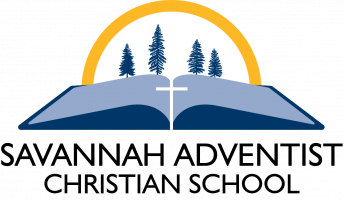SAVANNAH ADVENTIST CHRISTIAN SCHOOL
Preschool Curriculum Guide
“Train up a child in the way he should go,
and when he is old he will not depart from it.”
Proverbs 22:6
BIBLE – Children are taken on an exciting journey through the Old Testament as they learn about God. The foundational principles of character traits such as obedience and kindness are established with children through exciting Bible stories. Many of these principals are taught through songs. The teaching of Christian values and character is at the core of each Bible lesson, as well as the entire learning process.
CHAPEL – This is a special time where teachers and students alike join in prayer, singing and praising God for loving us. Once a week our younger children join our older students for chapel.
MATHEMATICS- A three year old student begins to develop counting skills up to the number 15, as well as recognition of numbers in print up to 5. Students will begin to recognize and identify written numbers, shapes, and colors. Students also begin to build basic math concepts through sets, ordering items by size, sorting, grouping and identifying one-to-one correspondence. Three year olds learn to identify, copy and extend simple patterns, such as the ABAB and ABCABC patterns. Three year olds also begin to demonstrate an understanding of positional concepts such as up, down, over and under.
SCIENCE – The three-year-old student develops an understanding of graphs, what they are for and understanding a group that shows more or less. Using the senses is an important part of learning about the world. Teachers will guide students to use their senses to observe, describe and compare objects and events. Tools and measuring devices, such as rulers and measuring cups, are used to gather information. We will also explore nature and study the beautiful world God created.
SOCIAL STUDIES – The three-year-old student begins to understand self-awareness and family. Students learn to state their first and last name, and are encouraged to express pride in their accomplishments. Artwork will be displayed for the class and parents to see and students are praised for their work in the class. Students begin exploring community jobs and activities related to the jobs. Family experiences and traditions are an important part of the students’ social development. Students learn to name family members, talk about family experiences and traditions and share stories.
LANGUAGE ARTS – A three-year-old student develops an understanding of new vocabulary words by following directions and follows one-step directions that include new vocabulary words. New vocabulary words are introduced into conversation through teacher-directed activities such as naming pictures. Three year olds begin to recognize and understand the concept of rhyming. Students begin listening for beginning word sounds and learn to match words with the same beginning sound. Story time is an important part of understanding letters and how they work together to create words. Students are given some time each week in the reading center that allows them to choose books on their own and develop a love of reading.
PHYSICAL EDUCATION – Students will participate in activities that: improve both their fine and gross motor skills, teach the importance of being physically fit, as well as sportsmanship and how to interact with their peers.
MUSIC- Musical games & movement, fun songs, steady beat, and rhythm stick activities are a part of our music program. Students will develop listening skills as they learn to accompany songs with simple instruments.
TECHNOLOGY – Students begin an introduction to computers. Basic skills are introduced to start their journey towards technological literacy.
SPANISH – Students are introduced to Spanish vocabulary through interactive games & songs.
LEARNING CENTERS – The learning centers are areas of the classroom that are designed to allow children the freedom to explore games, literacy, math, and science activities, art, dramatic play, and building activities. Teachers will facilitate learning in these centers by offering materials that encourage the children to explore and develop new skills. However, the teacher does not direct the learning as the children explore freely within the center.
RECESS – Gross motor activities, free play, and lots of time to socialize are crucial to a young child’s development. A daily playtime is provided on the outside playground.
